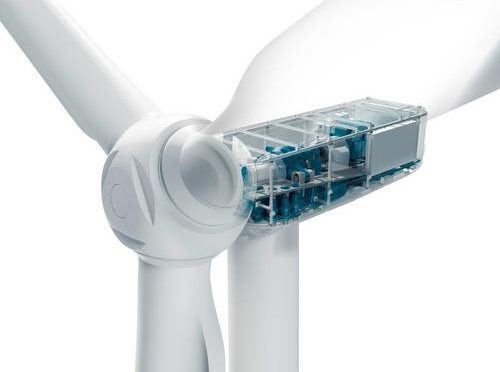At the Husum Wind wind fair, taking place from 12 – 15 September 2017, the Nordex Group will present the latest development stage of its successful Delta platform: the Delta4000 series. The N149/4.0-4.5 turbine, which has been designed specifically for light-wind regions, has a 30 percent increase in rotor sweep and a variable power output of 4.0 to 4.5 MW. The N149/4.0-4.5 is currently the highest yielding onshore turbine for light-wind regions in the class of 4 – 4.5 MW.
What makes the N149/4.0-4.5 special is its potential to meet a wide range of site-specific requirements with one hardware version. As the maximum output of the turbine varies between 4.0 and 4.5 MW, it is ideal for adapting to the grid operator’s individual requirements, local wind conditions and noise restraints. This also means that it’s possible to optimise the overall yield of a wind farm by means of the different maximum output of individual turbines, thus always exploiting the full potential of each turbine position within each single wind farm. This is an advantage, among other things, with large-scale projects that often come with different wind conditions and complex topography. The N149/4.0-4.5 ensures that the highest possible energy yield is obtained: up to 28 percent more compared to the N131/3600 turbine.
“The latest turbine showcases another milestone in wind development. It’s a highly competitive product with strong performance and a double-digit increase in efficiency, enabling us to further reduce the cost of energy to our customers”, says José Luis Blanco, CEO Nordex SE.
The rotor diameter was increased by 18 metres, compared to the N131, and the company has kept the same one piece rotor blade structure while optimising the design for transport and production. For instance, the main girders of the rotor blade are made of carbon fibre, which was introduced for the first time in 2010 for the N117/2400 and is also being used for the N131 turbine since 2014. The rotor blade structure was developed, in part, by knowledge and expertise provided by SSP, a Danish manufacturer which specialises in longer rotor blades and was taken over by the Nordex Group spring this year.
The maximum sound power level of the N149/4.0-4.5 lies between 103.6 dB(A) and 106.1 dB(A), proudly making it currently the quietest turbine in the 4.0-4.5 MW class for light wind sites. In addition to this, at sites with lower permissible noise requirements, the turbine can operate in a large number of sound-optimising modes. These can be individually controlled on the basis of wind direction, time of day, outside temperature or local public holidays in order to keep the acoustic load as low as possible and meet legislative requirements.
The towers initially available include those with hub heights of 105 to 164 metres. Especially for cold climate regions, the Nordex Group also offers a cold-climate variant and a rotor blade Anti-icing System.
The turbine is designed for an operational lifetime of 20 years while, depending on local site conditions of the wind farm, an operating life of up to 25 years can also be attested to. With this package, the company caters for customer requirements of maximum flexibility in its core markets.
In developing the N149/4.0-4.5, the company has drawn on tried and tested technology and made use of synergies between the main components from both the Nordex and Acciona Windpower platforms. For instance, in future, for the N149/4.0-4.5, the group will use a single common gearbox manufacturer.
The Nordex Group plans to start series production of the N149/4.0-4.5 in 2019. The first test turbines will be set up in 2018 in order to determine the parameters of relevance for certification.
Generation Delta currently includes the following turbine types: N100/3300, N117/3000, N117/3600, N131/3000, N131/3300, N131/3600, N131/3900 and the new N149/4.0-4.5 in the Delta4000 series.
Nordex at HusumWind 2017: Hall 1, stand no. B11
The Group has installed more than 21 GW of wind energy capacity in over 25 markets and in 2016 generated revenues of EUR 3.4 billion. The company currently employs a workforce of approx. 5,000. The joint manufacturing capacity includes factories in Germany, Spain, Brazil, the United States and India. The product portfolio is focused on onshore turbines in the 1.5 to 4.5 MW class, which are tailor-made for the market requirements in developed and emerging markets.



